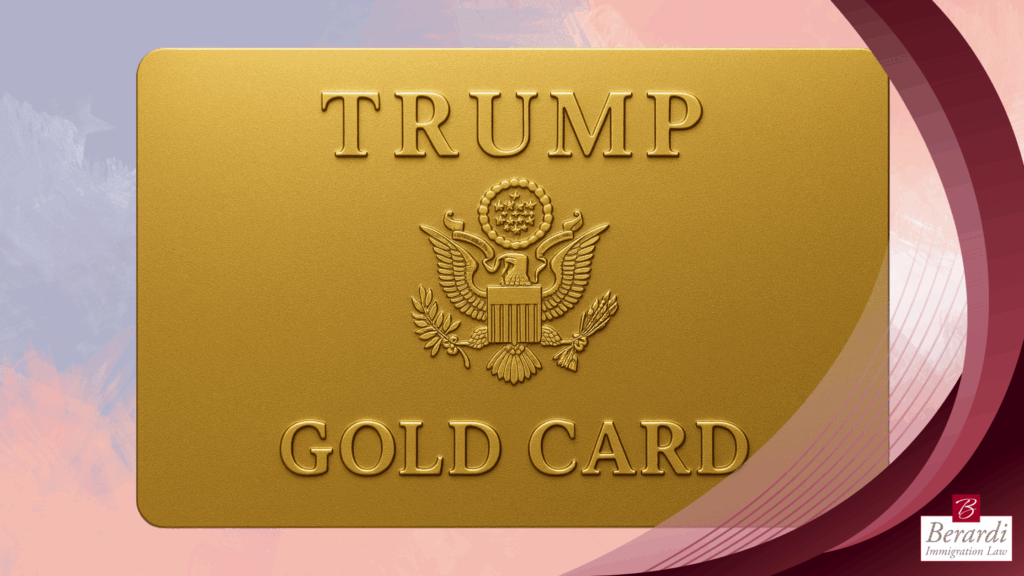The Trump administration has unveiled a new immigration initiative called the Gold Card, introduced by executive order on September 19, 2025. The program aims to offer wealthy foreigners an expedited pathway to U.S. permanent residency (a green card), under a new fast-track regime. Here’s what the Gold Card is, who it applies to, how it might work, and what remains unclear.
What Is the Gold Card Program?
The Gold Card is a visa/residency program created by executive order to give certain non-U.S. persons a faster route to immigrant visas. According to the White House fact sheet:
- An individual applicant must make a $1 million “gift” to the U.S. government. For corporate sponsorship of an individual, the gift requirement rises to $2 million.
- These contributions are meant to act as evidence of exceptional business ability and national benefit, similar concepts to those used for EB-1 (extraordinary ability) or EB-2 NIW (national interest waiver) categories.
- The program is to be overseen by the Secretary of Commerce in coordination with the Secretaries of State and Homeland Security. They are ordered to establish the application process, expedited adjudication, and visa issuance for those who qualify.
What You Get, and What It Might Replace
- A person approved under the Gold Card would receive lawful permanent resident status, under similar statutory bases as EB-1 or EB-2 (national interest waiver), assuming other requirements are also met.
- The Gold Card is intended to replace or significantly change the role of existing investor-based visas (like EB-5) in how residency is granted via economic contributions.
How the Gold Card Works: Key Requirements & Process
Here are the steps and criteria we know so far:
- Application + processing fee: Applicants begin with a nonrefundable processing fee to kick off the Gold Card application.
- Eligibility & vetting: The applicant must be eligible for lawful permanent resident status, must be admissible under U.S. immigration law, and a visa must be available. They will also undergo vetting by DHS and other relevant agencies.
- Gift contribution: After processing/approval, the applicant or corporate sponsor must provide the required “gift” ($1 million individual / $2 million corporate) to the U.S. Treasury or a fund as stipulated.
- Expedited adjudication: The order mandates that Commerce, State, and Homeland Security set up an expedited adjudication process. Decisions are expected to move faster than ordinary visa pathways.
What Is Still Unclear
While the executive order gives the broad framework, many important details remain undefined:
- How many Gold Cards will be issued annually, and what the cap might be.
- What exact standards will be used to determine eligibility beyond the financial “gift” (e.g., background, business experience).
- How this interacts with existing immigration and tax laws, especially for people who maintain income overseas.
- Whether Congress’s approval is required for key aspects, such as taxation, caps, or changes to visa statutes.
Perspective from Berardi Immigration Law
Rosanna Berardi, Esq., Managing Partner at Berardi Immigration Law, emphasizes:
“The Gold Card program introduces a new kind of residency path, one based on financial contribution paired with national benefit. But applicants should understand that large parts of the program are not yet finalized. Strong legal advice will be critical to navigating what could become a very high-stakes application.”
FAQs on the Gold Card
Can anyone apply if they can pay $1 million?
Not necessarily. Beyond the financial gift, an applicant must meet admissibility requirements, eligibility for permanent residency, and demonstrate national benefit. Simply having funds is not enough to get a card.
What does “corporate sponsor” mean under this program?
A corporation or similar entity may provide the required “gift” for one or more employees, subject to the rules set by Commerce, State, and Homeland Security. The order allows corporate sponsorship for individuals.
Will current investor visas like EB-5 still operate?
EB-5 is likely to be affected. The Gold Card program is intended, in part, to replace or overhaul investor-based immigration, but we do not yet know whether EB-5 will continue in parallel or be phased out.
Final Thoughts
The Trump Gold Card represents a major shift in U.S. immigration policy, one that privileges financial contribution and “national benefit” in ways not seen under traditional visa categories. For wealthy individuals considering U.S. residency, this could offer a faster route, but also comes with new uncertainty and risk. Legal counsel, careful planning, and staying updated as regulatory details are released will be essential.
At Berardi Immigration Law, we will be able to help clients evaluate whether the Gold Card could work for them based on their background, goals, and ability to meet the financial and legal requirements. If you’re considering the Gold Card, or any immigration pathway, now is the time to begin gathering the documentation and exploring your eligibility. Contact our team to begin your immigration process today.


